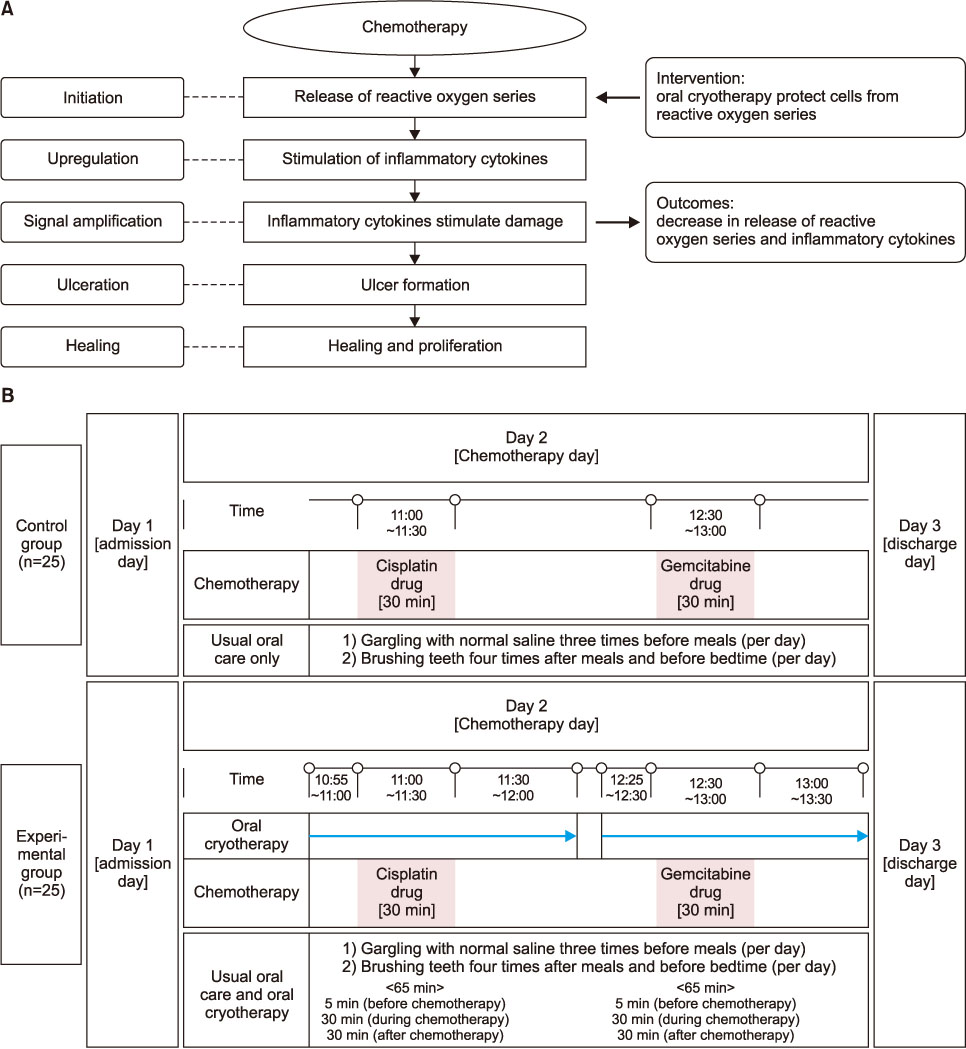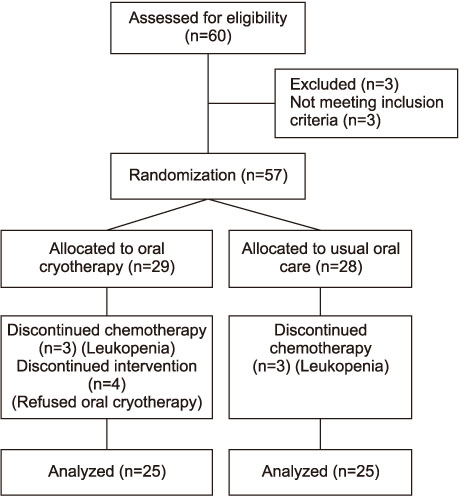J Korean Acad Nurs.
2019 Apr;49(2):149-160. 10.4040/jkan.2019.49.2.149.
The Effects of Oral Cryotherapy on Oral Mucositis, Reactive Oxygen Series, Inflammatory Cytokines, and Oral Comfort in Gynecologic Cancer Patients Undergoing Chemotherapy: A Randomized Controlled Trial
- Affiliations
-
- 1Department of Nursing, Bundang CHA Hospital, Seongnam, Korea.
- 2College of Nursing, Ewha Womans University, Seoul, Korea. yxk12@ewha.ac.kr
- KMID: 2444830
- DOI: http://doi.org/10.4040/jkan.2019.49.2.149
Abstract
- PURPOSE
The purpose of this study was to examine the effects of oral cryotherapy on oral mucositis, reactive oxygen series, inflammatory cytokines, and oral comfort in patients undergoing chemotherapy for gynecologic cancers.
METHODS
Participants were randomly assigned to the experimental group (n=25, receiving oral cryotherapy during chemotherapy) and the control group (n=25, receiving the usual care consisting of 0.9% normal saline gargles three times before meals). Oral mucositis was assessed using the oral assessment guide, while oral comfort was assessed using the oral perception guide. Reactive oxygen series was measured as total oxidant stress, and the level of two inflammatory markers, interleukin-6 (IL-6) and tumor necrosis factor-alpha (TNF-α), were examined. The data were analyzed using t-test, chi-square test, Fisher's exact test, Mann-Whitney U-test, and repeated measures analysis of variance.
RESULTS
There was a significant difference in the oral mucositis score, reactive oxygen series score, TNF-α level, and oral comfort score between the two groups, and there were significant changes over time and in the group-by-time interactions. There was a significant difference in the IL-6 score between the two groups, but there were no significant changes over time or in the group-by-time interactions.
CONCLUSION
The study results revealed that oral cryotherapy was more effective than the usual care regime of normal saline gargles for reducing oral mucositis, reactive oxygen series, and inflammatory cytokines and for improving oral comfort in gynecologic cancer patients undergoing chemotherapy.
Keyword
MeSH Terms
Figure
Reference
-
1. Yilmaz SD, Bal MD, Beji NK, Arvas M. Ways of coping with stress and perceived social support in gynecologic cancer patients. Cancer Nursing. 2015; 38(2):E57–E62. DOI: 10.1097/NCC.0000000000000186.
Article2. Costello BA, Borad MJ, Qi Y, Kim GP, Northfelt DW, Erlichman C, et al. Phase I trial of everolimus, gemcitabine and cisplatin in patients with solid tumors. Investigational New Drugs. 2014; 32(4):710–716. DOI: 10.1007/s10637-014-0096-3.
Article3. Sonis ST. The pathobiology of mucositis. Nature Reviews Cancer. 2004; 4(4):277–284. DOI: 10.1038/nrc1318.
Article4. Jang JS, Kim HK, Cho BC, Lee KH, Yun HJ, Woo IS, et al. Randomized phase II study comparing weekly docetaxel-cisplatin vs. gemcitabine-cisplatin in elderly or poor performance status patients with advanced non-small cell lung cancer. Cancer Chemotherapy and Pharmacology. 2017; 79(5):873–880. DOI: 10.1007/s00280-017-3289-6.
Article5. Kanuga S. Cryotherapy and keratinocyte growth factor may be beneficial in preventing oral mucositis in patients with cancer, and sucralfate is effective in reducing its severity. The Journal of the American Dental Association. 2013; 144(8):928–929. DOI: 10.14219/jada.archive.2013.0211.
Article6. Heydari A, Sharifi H, Salek R. Effect of oral cryotherapy on combination chemotherapy-induced oral mucositis: A randomized clinical trial. Middle East. Journal of Cancer. 2012; 3(2&3):55–64.7. Erdem Ö, Güngörmüş Z. The Effect of royal jelly on oral mucositis in patients undergoing radiotherapy and chemotherapy. Holistic Nursing Practice. 2014; 28(4):242–246. DOI: 10.1097/HNP.0000000000000033.
Article8. Erden Y, Ipekcoban G. Comparison of efficacy of cryotherapy and chlorhexidine to oral nutrition transition time in chemotherapy-induced oral mucositis. European Journal of Cancer Care. 2017; 26(5):e12495. DOI: 10.1111/ecc.12495.
Article9. Chaveli-López B, Bagán-Sebastián JV. Treatment of oral mucositis due to chemotherapy. Journal of Clinical and Experimental Dentistry. 2016; 8(2):e201–e209. DOI: 10.4317/jced.52917.10. Kung AYH, Zhang S, Zheng LW, Wong GHM, Chu CH. Oral health status of Chinese paediatric and adolescent oncology patients with chemotherapy in Hong Kong: A pilot study. The Open Dentistry Journal. 2015; 9:21–30. DOI: 10.2174/1874210601509010021.11. Lalla RV, Bowen J, Barasch A, Elting L, Epstein J, Keefe DM, et al. MASCC/ISOO clinical practice guidelines for the management of mucositis secondary to cancer therapy. Cancer. 2014; 120(10):1453–1461. DOI: 10.1002/cncr.28592.
Article12. Eilers J, Harris D, Henry K, Johnson LA. Evidence-based interventions for cancer treatment-related mucositis: Putting evidence into practice. Clinical Journal of Oncology Nursing. 2014; 18(6):80–96. DOI: 10.1188/14.CJON.S3.80-96.
Article13. Brown CG. A guide to oncology symptom management. 2nd ed. Pittsburgh (PA): Oncology Nursing Society;2015. p. 469–482.14. Park SJ, Cha GS, Kim HS, Park EY. Effects of oral care protocol on oral mucositis in hematologic malignancy patients receiving chemotherapy. Journal of Korean Clinical Nursing Research. 2016; 22(1):1–9. DOI: 10.22650/JKCNR.2016.22.1.1.15. Peterson DE, Bensadoun RJ, Roila F. ESMO Guidelines Working Group. Management of oral and gastrointestinal mucositis: ESMO clinical practice guidelines. Annals of Oncology. 2011; 22:Suppl 6. vi78–vi84. DOI: 10.1093/annonc/mdr391.
Article16. dos Reis PED, Ciol MA, de Melo NS, de Souza Figueiredo PT, Leite AF, de Melo Manzi N. Chamomile infusion cryotherapy to prevent oral mucositis induced by chemotherapy: A pilot study. Supportive Care in Cancer. 2016; 24(10):4393–4398. DOI: 10.1007/s00520-016-3279-y.
Article17. Svanberg A, Öhrn K, Birgegård G. Caphosol(®) mouthwash gives no additional protection against oral mucositis compared to cryotherapy alone in stem cell transplantation. A pilot study. European Journal of Oncology Nursing. 2015; 19(1):50–53. DOI: 10.1016/j.ejon.2014.07.011.
Article18. Kakoei S, Ghassemi A, Nakhaee N. Effect of cryotherapy on oral mucositis in patients with head and neck cancers receiving radiotherapy. International Journal of Radiation Research. 2013; 11(2):117–120.19. Eilers J, Berger AM, Petersen MC. Development, testing, and application of the oral assessment guide. Oncology Nursing Forum. 1988; 15(3):325–330.20. Beck S. Impact of a systematic oral care protocol on stomatitis after chemotherapy. Cancer Nursing. 1979; 2(3):185–199.
Article21. Park YJ, Hong MS. The influence of saline and betadine solution for gargle in the leukemic patients receiving chemotherapy. Chonnam Journal of Nursing Science. 1996; 1:41–58.22. Park MH, Park JS. Difference of oral mucositis in hospitalized cancer patients receiving chemotherapy. Asian Oncology Nursing. 2013; 13(2):76–84. DOI: 10.5388/aon.2013.13.2.76.
Article23. Son YJ, Shin YJ, Cho MY, Kim SH, Park OS, Han SY, et al. The development of an oral care protocol for cancer patients receiving chemotherapy and its effects. Journal of Korean Clinical Nursing Research. 2011; 17(1):113–122.24. Salvador P, Azusano C, Wang L, Howell D. A pilot randomized controlled trial of an oral care intervention to reduce mucositis severity in stem cell transplant patients. Journal of Pain and Symptom Management. 2012; 44(1):64–73.
Article25. Toro JJ, Schneider D, Alonzo R, Hasan A, Lee S, Gushiken F, et al. A prospective, randomized clinical trial of cryotherapy vs. supersaturated calcium phosphate rinses vs. saline rinses for the prevention of oral mucositis in patients with multiple myeloma (MM) receiving high-dose melphalan (HDM) and autotransplantation. Biology of Blood and Marrow Transplantation. 2014; 20(2):S204–S205. DOI: 10.1016/j.bbmt.2013.12.340.
Article26. Yoshino F, Yoshida A, Nakajima A, Wada-Takahashi S, Takahashi S, Lee MC. Alteration of the redox state with reactive oxygen species for 5-fluorouracil-induced oral mucositis in hamsters. PLoS One. 2013; 8(12):e82834. DOI: 10.1371/journal.pone.0082834.
Article27. Zorov DB, Juhaszova M, Sollott SJ. Mitochondrial reactive oxygen species (ROS) and ROS-induced ROS release. Physiological Reviews. 2014; 94(3):909–950. DOI: 10.1152/physrev.00026.2013.
Article28. Svanberg A, Öhrn K, Broström H, Birgegård G. The effect of cryotherapy on oral mucosa: A study in healthy volunteers. Medical Oncology. 2012; 29(5):3587–3591. DOI: 10.1007/s12032-012-0230-z.
Article29. Jastrząbek R, Straburzyńska-Lupa A, Rutkowski R, Romanowski W. Effects of different local cryotherapies on systemic levels of TNF-α, IL-6, and clinical parameters in active rheumatoid arthritis. Rheumatology International. 2013; 33(8):2053–2060. DOI: 10.1007/s00296-013-2692-5.
Article30. Wilberg P, Hjermstad MJ, Ottesen S, Herlofson BB. Chemotherapy-associated oral sequelae in patients with cancers outside the head and neck region. Journal of Pain and Symptom Management. 2014; 48(6):1060–1069. DOI: 10.1016/j.jpainsymman.2014.02.009.
Article
- Full Text Links
- Actions
-
Cited
- CITED
-
- Close
- Share
- Similar articles
-
- The Effects of Oral Cryotherapy on Nausea, Vomiting, Oral Mucositis, and Oral Pain in Breast Cancer Patients Undergoing Chemotherapy
- Chemotherapy Related Oral and Gastrointestinal Mucositis
- Difference of Oral Mucositis in Hospitalized Cancer Patients Receiving Chemotherapy
- Proper Oral Hygiene and Dental Care for Cancer Patients
- Sodium Bicarbonate Solution versus Chlorhexidine Mouthwash in Oral Care of Acute Leukemia Patients Undergoing Induction Chemotherapy: A Randomized Controlled Trial



